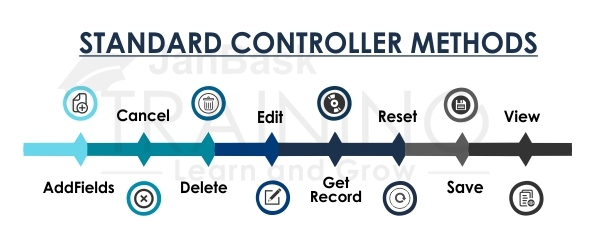12
JulInternational Womens Day : Flat 30% off on live classes + 2 free self-paced courses - SCHEDULE CALL
Salesforce is one of the easiest, yet one of the trickiest technologies available in the market today. This is simply because in the back end it does deal with a few things that necessarily need a technical skill set to accomplish the tasks at hand. One such tricky thing to comprehend is the concept of Standard Controllers in Salesforce.
Today we would discuss what a standard controller in Salesforce is? To understand the topic at hand better, we have divided the blog into the following parts-
Visualforce utilizes the conventional model– view– controller (MVC)paradigm and incorporates refined inherent controllers to deal with standard activities and information access handles, furnishing basic and tight integration with the Lightning Platform database. These implicit controllers are referred to by and large as standard controllers, or even the standard controller.
The MVC configuration design makes it simple to isolate the view and its styling from the basic database and rationale. In MVC, the view (the Visualforce page) associates with a controller, and the controller gives usefulness to the page. For instance, the controller can contain the rationale to be executed when a link is clicked. A controller likewise regularly associates with the model (the database)— making available the information that the view s needs to show, or driving changes back to the database.  Most of the standard and every custom object have standard controllers that can be utilized to collaborate with the information related to the question, so you don't have to compose the code for the controller yourself. You can stretch out the standard controllers to include new usefulness, or make custom controllers without any preparation.
Most of the standard and every custom object have standard controllers that can be utilized to collaborate with the information related to the question, so you don't have to compose the code for the controller yourself. You can stretch out the standard controllers to include new usefulness, or make custom controllers without any preparation.
Take our online Salesforce training course and become an expert on Salesforce in no time.
Salesforce Training For Administrators & Developers
Read: A Guide on How to Get & Reset Security Token in Salesforce Lightning

The collaboration between a client and their business information can be straight forward or complex, yet in any case, it requires a point by point set of guidelines and standards to be overseen. The controller is the object that gives such an administration while saving a perfect detachment between the view layer and the information model.
In the MVC design, Views know how to show their information and acknowledge the contribution from the client, however, they may know nothing about how to really bring that information or process it. Information Models know how to perform different tasks, for example, Save, Delete or Merge, however, should be advised when to work, and should be furnished with the requisite information to work on.
It is the Controller’s job to marshal both data and action selection, as initiated by the user from within the View, to the Model. Controllers are also responsible for responding accordingly with navigation redirection based on the results of any particular action. In the Salesforce MVC paradigm, it is the standard controller that facilitates the ability of users to access and interact with the structured business data contained in records and displayed in the materialized user interface.  It is the Controller's business to marshal both the information and the activity choice, as stated by the client from inside the View, to the Model. Controllers are additionally in charge of reacting appropriately with route redirection in view of the consequences of a specific activity. In the Salesforce MVC worldview, it is the standard controller that encourages the capacity of clients to get to and communicate with the organized business information contained in records and displayed in the appearing UI.
It is the Controller's business to marshal both the information and the activity choice, as stated by the client from inside the View, to the Model. Controllers are additionally in charge of reacting appropriately with route redirection in view of the consequences of a specific activity. In the Salesforce MVC worldview, it is the standard controller that encourages the capacity of clients to get to and communicate with the organized business information contained in records and displayed in the appearing UI.
Developers may expect that they should turn to the usage of custom Apex rationale to give complex usefulness that their applications require, yet may be ignorant about the fact that such use may as of now be accessible to them in Visualforce by means of standard controller components.  It is a best practice to ensure that you comprehend what is accessible to use in the standard controller layer before you start to outline and manufacture your own particular custom pages and controllers to abstain from 'reinventing the wheel.'
It is a best practice to ensure that you comprehend what is accessible to use in the standard controller layer before you start to outline and manufacture your own particular custom pages and controllers to abstain from 'reinventing the wheel.'

Read: How To Use Custom Labels In Apex Class In Salesforce?
The accompanying are methods for Standard Controller. All are instance methods-
Learn Salesforce in the Easiest Way

Activity methods perform logic or route when a page event happens, for example, when a client clicks on a tab, or is hovering over a region of the page. Activity strategies can be called from page markup by utilizing {!} documentation in the action parameter of one of the accompanying tags:
<apex:commandButton> This command creates a tab that calls an action method<apex:commandLink> This command is used to create a link that calls an action<apex:actionPoller> You can use this command to periodically call an action<apex:actionSupport> This command makes an event (such as “onclick”, “onmouseover”, and so on) on another, named component, call an action<apex:actionFunction> This particular command defines a new type of JavaScript function that calls an action<apex:page> This particular command calls action in the Salesforce environment when the page is loadedTo utilize Standard Controller in Visualforce pages, the Standard Controller attribute must be utilized on <apex:page> tag. While executing standard controller property in Visualforce pages, we cannot utilize the controller attribute simultaneously. These Standard controllers can control the information, can control activities and control navigation.
Here in this particular section, let us learn how you can create a visualforce page to execute & also understand the basic functionality of the standard controller attribute.
Read: A Basic Overview for Salesforce Security
Take a free demo session on our Salesforce training course. Register here!
Salesforce Training For Administrators & Developers

I believe by now it is clear what is controller in Salesforce?Standard Controller in Salesforce is of great use provided you know how to use it properly. It can easily save you a lot of trouble and coding as can be seen from the uses of the standard controller portion of this blog. I am sure that using the Standard Controller in Salesforce can easily increase your efficiency on the Salesforce system.
 Pinterest
Pinterest
 Email
Email
A dynamic, highly professional, and a global online training course provider committed to propelling the next generation of technology learners with a whole new way of training experience.

Cyber Security

QA

Salesforce

Business Analyst

MS SQL Server

Data Science

DevOps

Hadoop

Python

Artificial Intelligence

Machine Learning

Tableau
Search Posts
Related Posts
Receive Latest Materials and Offers on Salesforce Course
Interviews